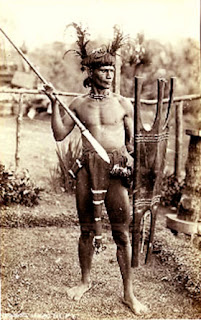INDIGENOUS TRIBES
There are various indigenous tribes in the Philippines with about 50 Filipino groups making up 16% of the entire population. (As of 1992). Here I shall elaborate more on 3;

BONTOC. IFUGAO. KALINGA

BONTOC. IFUGAO. KALINGA
As you can see, these 3 indigenous tribes reside fairly near each other. One must applaud them on not letting the Spanish affect their culture and traditions.

Bontoc, Philippines 1911
Its name derived from two morphemes - 'bun' (heap) 'tuk' (top) - Bontoc literally means 'mountains'. They reside in the Mountain Province which is in the Cordillera Administrative Region. All speak the language Bontoc though different villages within the area have different dialects; Sadanga, Guinaang, Bontoc.
One thing that changed however across all indigenous groups was headhunting. The Westerners outlawed headhunting in the 1900s. Before that, warriors of this tribe were very active in head hunting when confronting opposing warriors of other tribes. After a victorious battle, the enemy's decapitated head becomes their property. Only the head because the head is believed that the spirit would be at service of the owner which increases his power ads a warrior.
The owner preserves the head by;

IFUGAO
Ifugao man showing off his collection of skulls

Bontoc, Philippines 1911
Its name derived from two morphemes - 'bun' (heap) 'tuk' (top) - Bontoc literally means 'mountains'. They reside in the Mountain Province which is in the Cordillera Administrative Region. All speak the language Bontoc though different villages within the area have different dialects; Sadanga, Guinaang, Bontoc.
One thing that changed however across all indigenous groups was headhunting. The Westerners outlawed headhunting in the 1900s. Before that, warriors of this tribe were very active in head hunting when confronting opposing warriors of other tribes. After a victorious battle, the enemy's decapitated head becomes their property. Only the head because the head is believed that the spirit would be at service of the owner which increases his power ads a warrior.
The owner preserves the head by;
- boiling it in hot water to clean it,
- removing the lower jaw,
- burying it in a special room,
- for a year

IFUGAO
Ifugao man showing off his collection of skulls
The Ifugao generally just grow rice, beans, onions and gobi on their terraces as their form of livelihood. All would be able to understand Ifugaw Batad but the different dialects would be Hapao Ifugao, Hungduan Ifugao, Lagawe Ifugao, Ayangan Ifugao, Batad Ifugao and Ducligan Ifugao.
Headhunting for this indigenous tribe has an added ritual. For weapons, warriors lashed wooden boards together with rattan and used them as shields in batte. Upon returning victorious, they woul reenter the village carrying their steel headed lance ang shields in a parade-like formation; bent low to the groud and beating their shields with sticks of wood, swaying in sync. The Ifugao would bring home the decapitated enemy's head for decoration (see picture above). However the owner must take care to fasten the lower jaw in place to prevent it from dislodging.
On the other hand if an Ifugao warrior were to lose his head during a battle, said body of said warrior would be berated by his family for getting killed, as it is a disgrace.
These Ifugao however also have less violent hobbies. Native craft making. They enjoy carving dinnerware resembling humans so much so that their carved dinner spoons are brought during travels. This was also for social courtesy due to the high probability of hosts of poorer tribes not having additional spoons to spare the travellers.

KALINGA
Warrior
Headhunting for this indigenous tribe has an added ritual. For weapons, warriors lashed wooden boards together with rattan and used them as shields in batte. Upon returning victorious, they woul reenter the village carrying their steel headed lance ang shields in a parade-like formation; bent low to the groud and beating their shields with sticks of wood, swaying in sync. The Ifugao would bring home the decapitated enemy's head for decoration (see picture above). However the owner must take care to fasten the lower jaw in place to prevent it from dislodging.
On the other hand if an Ifugao warrior were to lose his head during a battle, said body of said warrior would be berated by his family for getting killed, as it is a disgrace.
These Ifugao however also have less violent hobbies. Native craft making. They enjoy carving dinnerware resembling humans so much so that their carved dinner spoons are brought during travels. This was also for social courtesy due to the high probability of hosts of poorer tribes not having additional spoons to spare the travellers.

KALINGA
Warrior
In war, the Kalinga's choice of weaponary would be slender but deadly axes(below) and lances(above). When celebrating their victory, the hero of it would be given center stage to boast his preserverance.


ALIWA. KALASAG
AXE. SHIELD.
A marriage for the Kalinga's may be polygamus and not frowned upon. In fact it is expected. Hence in one family, there can be many wives. However having said that, there is always an elder, or a favourite wife, who does most of the decision making and household running.
To avoid a polygamous marriage however, the Kalinga's accept trial marriages whereby the couple's compatibility is tested.


ALIWA. KALASAG
AXE. SHIELD.
A marriage for the Kalinga's may be polygamus and not frowned upon. In fact it is expected. Hence in one family, there can be many wives. However having said that, there is always an elder, or a favourite wife, who does most of the decision making and household running.
To avoid a polygamous marriage however, the Kalinga's accept trial marriages whereby the couple's compatibility is tested.